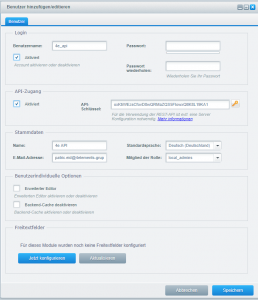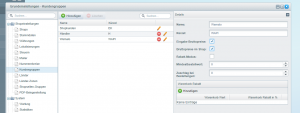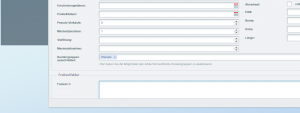WordPress Wemalo API 2
With the second version of the WordPress plugin, Wemalo has considerably extended the range of functions.
furnishing
- Download and activate the Wemalo Connectplugin from the WordPress shop.
- A user account must then be set up in wemalo-connect(by a Wemalo employee).
- The security key generated in wemalo-connect must be stored in the plugin configuration (a Wemalo entry has been added to the admin menu).
products
- If a product is updated, the change is sent directly to Wemalo via wemalo-connect.
- In addition, the product master data is requested by Wemalo at regular intervals. Since this is primarily required for the initial setup, the frequency of periodic queries is reduced.
mandatory fields
The only real mandatory field is the article number. However, they are also important for the warehouse processes:
- EAN (if article number cannot already be scanned)
- Article dimensions and weight (for storage and shipping)
- Product image (for visual verification)
- Product name (for name matching when picking/packing)
Expansion of products
The plugin extends the products and variants and adds the following information:
- New alternative stock field (for example, B goods)
- new field EAN (Tab Wemalo in main product)
- new setting possibility serial number (Tab Wemalo in main product)
- Overview of serial numbers/batches (Tab Wemalo in main product)
data transfer
- When the main product is saved, the data record is transmitted directly to Wemalo. The time stamp of the last data transfer is displayed in the Wemalo tab.
- A direct transmission also takes place when saving variants. Here the timestamp is displayed in the variant view.
- If an error occurs during transmission, the return of the server is output.
product bundles
- The WooCommerce product Bundle plugin has been supported since version 2.0.2 of the Wemalo plugin. The WooCommerce product Bundle plugin has been supported since version 2.0.2 of the Wemalo plugin.
- As an alternative to using a plugin in WooCommerce, sets can also be defined in Wemalo. To do this, the set product must be created as a normal product in WooCommerce and configured accordingly in Wemalo (done by the Wemalo customer consultant).
orders
- As soon as an order is set to “in progress”, data is transmitted to wemalo-connect and thus directly to Wemalo.
- The download timestamp is set immediately. If an error occurs during transmission, the error message is stored as a custom field.
- If the order could be completely reserved, it changes to a new fulfillment status.
- As long as the order has not been reserved and is being processed in the order, it can also be cancelled in Wemalo using the WordPress stroning function. However, if the order is ready for fulfillment, it must be cancelled manually in Wemalo.
- Once an hour, WooCommerce queries the current order status as long as the order has not yet been reserved.
Update orders
- If the order is not yet in fulfillment, it can be processed at any time.
status extension
- Returns registered (see Returns)
- Returns posted (see Returns)
- Order in fulfillment
If an order was sent to Wemalo, but cannot be set to Wemalo status open there (and thus released for picking), it will remain in processing status in WooCommerce and can still be cancelled from WooCommerce.
Wemalo fields in orders
- Blocked: if the checkbox is checked, a transfer is made to Wemalo and the order is picked and packed. In Wemalo, however, it lands in the status “blocked packed” and is sent only after release.
- Note: the text field can be used to send a note to the picker or packer.
- ETD: if the date field has been set and is in the future, the goods will be reserved, but in Wemalo no pick list can be created yet. Only when the date has been reached, the picking list can be created and the order further processed/sent.
Additionally there is the panel with wemalo with the following data:
- Priority: determines the priority of the order and can be distinguished between normal, high and very high. The priority affects the order of picking and reservation.
- Order: another WooCommerce order can be linked via order, in which the order number is entered. A function that goes beyond this does not exist (no link in wemalo or similar).
- Document upload: enables the upload of documents such as invoices or customs declarations.
- Promi: allows you to mark an order as a Promi dispatch. In addition, a text can be entered which is sent to an e-mail address stored in the configuration. This can be used, for example, to write individual texts for orders and attach them to the packages.
- Shipping: to hire the shipping service provider.
- Product: Depending on the shipping service provider, the shipping products can be selected.
- Returns no SN check: if products contain serial numbers, this flag can be used to switch off the validation of correctly returned serial numbers. The flag is transferred to wemalo when a return is registered.
tracking numbers
Tracking numbers are entered as notes and in the tracking_number field.
If wp_liste for Amazon or Ebay have been installed, the shipping service provider is entered in the field _wpla_tracking_provider (Amazon) / _wpl_tracking_provider (Ebay) and the tracking number in _wpla_tracking_number (Amazon) / _wpl_tracking_number (Ebay).
The tracking number can also be integrated into the e-mails sent automatically by WooCommerce when orders are completed. A manual can be found here: Insert tracking number e-mail at WooCommerce
shipping profiles
An external ID can be stored in Wemalo for matching the shipping profile to be sent. This comes from the WordPress installation and can be found under WooCommerce- > Settings- >Shipping.
Stock
- Wemalo’s doing a stock update. This means that the stocks changed in Wemalo are transferred to the WooCommerce shop at regular intervals. The stocks of A-goods are transferred to the normal warehouse stock. All other stocks (B-stock, C-stock, etc.) are entered in a separate field for alternative stocks.
- In order to be able to transfer stocks to WooCommerce, inventory management must be activated in the products on the shop side.
returns
- The Wemalo API plug-in offers the possibility to turn an order into a registered return. As soon as the status of the order has been changed accordingly, the return is sent to Wemalo.
- The return can then be scanned against the original order and the goods can therefore be validated.
- Wemalo reports the received goods back to the plugin and sets the status to Return booked.


